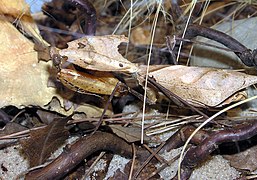Deroplatys desiccata
| Deroplatys desiccata | |
|---|---|
| Scientific classification | |
| Domain: | Eukaryota |
| Kingdom: | Animalia |
| Phylum: | Arthropoda |
| Class: | Insecta |
| Order: | Mantodea |
| Family: | Deroplatyidae |
| Genus: | Deroplatys |
| Species: | D. desiccata |
| Binomial name | |
| Deroplatys desiccata Westwood, 1839 | |
| Synonyms | |
| |
Deroplatys desiccata, known by the common name giant dead leaf mantis, is a praying mantis from Southeast Asia. This is the type species of genus Deroplatys.
Description
D. desiccata takes its common name from its resemblance to dead, leafy vegetation including having a flattened, greatly extended thorax and "intricate leaf patterns" on its wings.[1][2] This insect varies in color from mottled brown through "pale orangey brown" to a very dark brown that is almost black.[3][4]
This creature's camouflage is aided by its movements as well as its appearance. When disturbed, it rocks gently as if caught in the breeze. When threatened, it typically falls to the ground and lies motionless.[3][5][6][7] It can also react with a threatening display consisting of "black underwings splayed out, with large eyespots, frightening away unsuspecting predators."[8] The intricate lines on the mantis' body, which serve to look like the natural veins on a leaf, as well as its dark brown colors, are beneficial to the species as it has been shown to avoid the attention of aerial predators or other insects.
As its common name indicates, D. desiccata is larger than other species of dead leaf mantis. Females grow to 75–80 mm long. Displaying the sexual dimorphism typical of mantises, males grow only 65–70 mm long and are substantially smaller and lighter than females.[3][5][9][10] Females' prothorax shields end in a sharp pointed curve on each side while the males have a rounder shape. According to one source, males tend to be more "yellowish" than the darker females.[11]
- Adult female at Bristol Zoo, 2007
- Male prepared in the Beauchene technique
Range
D. desiccata inhabits scrubland and tropical forests of Borneo, Indonesia, Malaysia, Sumatra and the Philippines.[5][10]
See also
References
- ^ http://mantiskingdom.com/index.php?main_page=page&id=29&chapter=2 mantiskingdom.com: Dead Leaf Mantis D. Desiccata
- ^ http://tolweb.org/Deroplatys_desiccata/54050 Tree of Life Web Project. Deroplatys desiccata. Version 14 March 2006
- ^ a b c http://www.freewebs.com/vincek/speciesofmantids.htm Species of mantids: Dead Leaf Praying Mantid
- ^ Mielewczik, Michael; Liebisch, Frank; Walter, Achim; Greven, Hartmut (2012). "Near-Infrared (NIR)-Reflectance in Insects – Phenetic Studies of 181 Species" (PDF). Entomologie heute. 23: 183–215.
- ^ a b c http://www.exotic-pets.co.uk/dead-leaf-mantis.html Dead exotic-pets.co.uk: Leaf Praying Mantis
- ^ http://www.shearyadi.com/myworld/greatest-animals-camouflage/ shearyadi.com: Greatest animals camouflage
- ^ http://www.animalpicturesarchive.com/view.php?tid=3&did=27040&mode=full animalpicturesarchive.com: Dead Leaf Mantis (Deroplatys desiccata) camouflage
- ^ http://www.bugsincyberspace.com/deroplatys_desiccata.html Archived 1 August 2008 at the Wayback Machine bugsincyberspace.com: Deroplatys desiccata
- ^ "MantisOnline.de - Species". www.mantisonline.info. Retrieved 30 March 2023.
- ^ a b http://www.phasmidsincyberspace.com/DeroplatysDessicata.html Phasmids in Cyberspace: Deroplatys dessicata
- ^ http://www.mantisphotos.com/deroplatys.htm Archived 24 April 2008 at the Wayback Machine mantisphotos.com: Malaysian Dead Leaf Mantis
External links
 Media related to Deroplatys desiccata at Wikimedia Commons
Media related to Deroplatys desiccata at Wikimedia Commons


